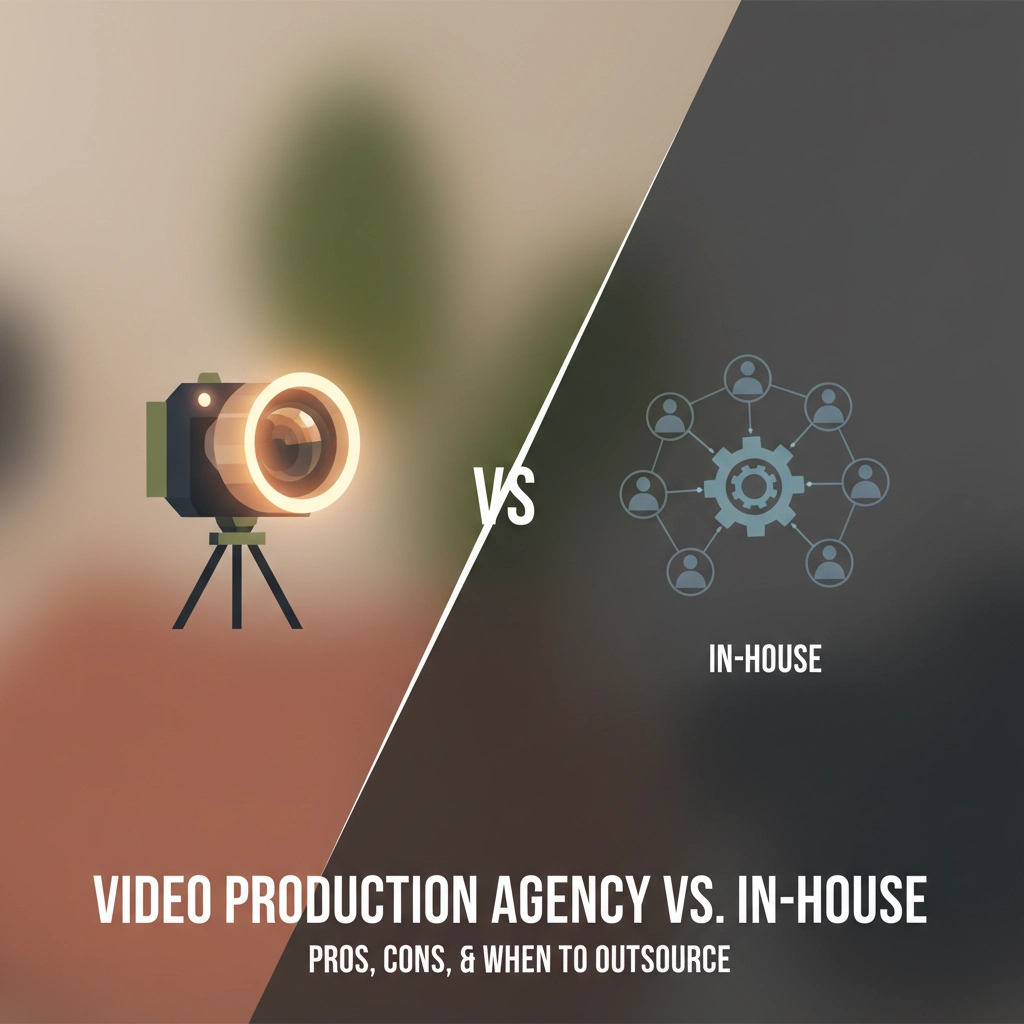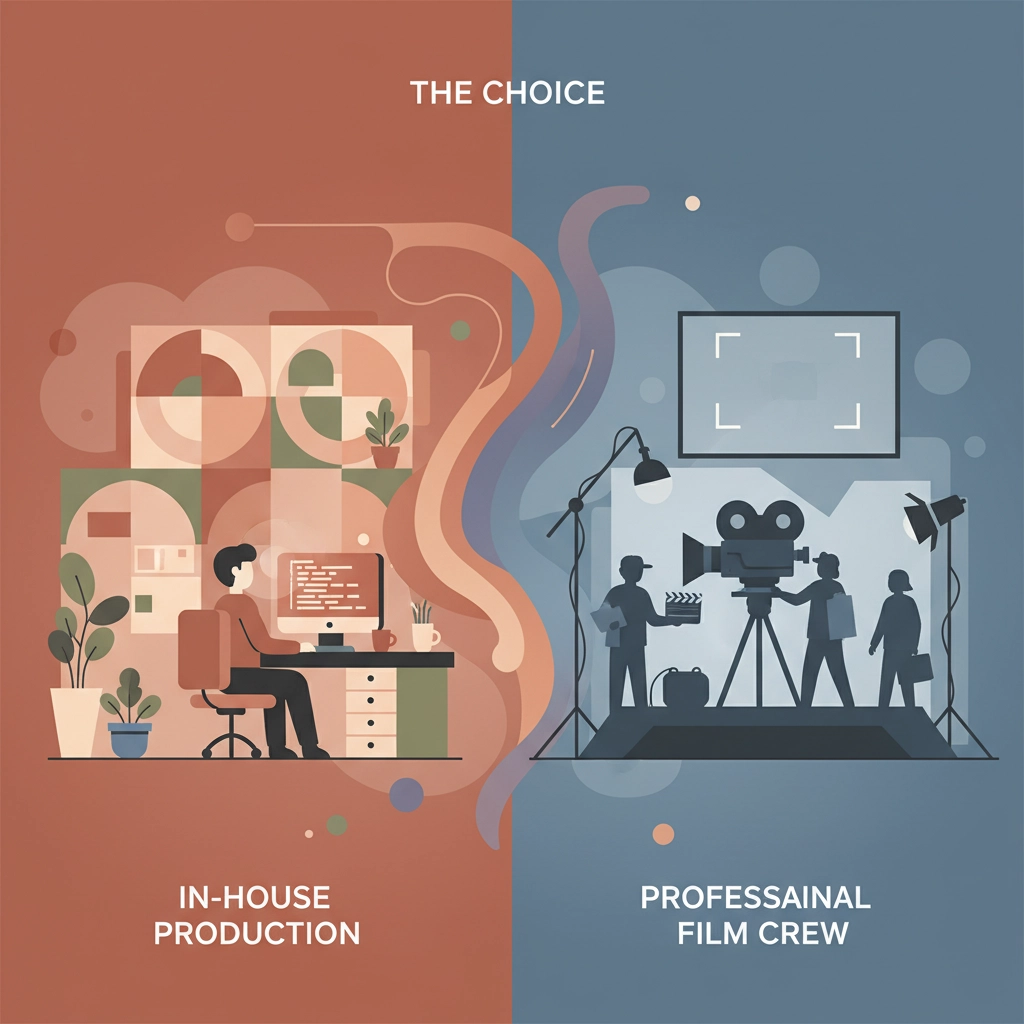Video Production Agency vs. In-House: Pros, Cons, and When to Outsource

So you're staring at your 2025 budget, and there's that line item staring back at you: video production. Your marketing team's been pushing for more video content (and honestly, they're right), but here's the million-dollar question, literally, do you build an in-house team or partner with an agency?
It's like choosing between buying a car or using Uber. Both get you where you need to go, but the math changes dramatically depending on how often you're making the trip.
Let's break this down without the corporate fluff, shall we?
The In-House Route: Your Very Own Video Dream Team
Building an in-house video production team is like having a personal chef, they know exactly how you like your content served, and they're available whenever hunger strikes.
The Sweet Spots of Going In-House
They Get You (Really Get You)
Your in-house team doesn't need a two-hour brand briefing every time you want a video. They live and breathe your company culture. They know that when you say "make it pop," you mean the specific shade of blue from your brand guidelines, not some generic interpretation.
Take Shopify here in Ottawa, their internal content team produces dozens of merchant success stories monthly. Because they're embedded in the company, they understand the nuanced difference between a small business owner and an enterprise client without needing constant direction.
Speed That Makes Your Head Spin
Need a same-day social media video because your CEO just announced something big? Your in-house team can literally walk down the hall and make it happen. No contracts, no scheduling conflicts with other clients, no waiting three weeks for the "next available slot."
The Long Game Pays Off
Here's where the math gets interesting. Sure, you're looking at roughly $90,000 annually for a decent videographer, plus equipment costs that can hit $20,000+ for a basic setup. But if you're cranking out weekly content? That per-video cost drops fast.
RBC's internal communications team in Toronto produces everything from training videos to executive updates. With their volume, the cost per piece is probably lower than your lunch budget.

Where In-House Gets Tricky
The Startup Costs Will Make You Wince
Remember that $20,000 equipment budget? That's just the beginning. Add software subscriptions, ongoing training, and the reality that technology becomes obsolete faster than your teenager's slang.
Jack of All Trades, Master of... Some
Your in-house videographer might be great at talking-head interviews but struggle with product cinematography. They're wearing every hat from scriptwriter to colorist, and some of those hats don't fit quite right.
The Objectivity Problem
Sometimes you need someone to tell you that your brilliant idea isn't actually brilliant. In-house teams can get too close to the forest to see the trees, missing opportunities that an outside perspective would catch immediately.
The Agency Route: Bring in the Pros
Working with a video production agency is like hiring a specialized contractor for your dream kitchen: they cost more upfront, but they bring expertise you simply can't replicate in-house.
Why Agencies Shine
Equipment That Would Make Hollywood Jealous
Agencies roll up with gear that costs more than most people's cars. We're talking cinema-quality cameras, professional lighting rigs, and post-production software that requires its own IT department.
When Manulife needed their annual shareholder video, they didn't try to DIY it with their marketing team's DSLR. They brought in professionals with the tools to make their executives look presidential.
Fresh Eyes, Fresh Ideas
Agencies work with dozens of clients across different industries. That cross-pollination of ideas means they're bringing insights from a tech startup in Waterloo to help solve a manufacturing company's video challenge in Hamilton.
Specialists in Every Corner
Need motion graphics? They've got an animator. Require a professional voice-over? They know three in Toronto. Want drone footage? Their pilot's already licensed. It's like having an entire production studio on speed dial.

The Agency Reality Check
Your Wallet Will Feel It
Agency costs typically range from $5,000 for simple projects to $50,000+ for complex productions. If you need video content monthly, those numbers add up faster than Tim Hortons runs during an office meeting.
You're Not the Only Client
That amazing agency you want to work with? They're probably juggling five other projects. Your "urgent" request might hit their queue right after a major campaign for a national retailer.
The Learning Curve Never Ends
Every new project means re-explaining your brand, your audience, and your goals. It's like having a new babysitter every time: technically qualified, but they don't know that your brand voice never uses exclamation points.
The Math That Matters
Let's get real about the numbers. If you're producing more than one substantial video per month, in-house starts making financial sense. Less than that? Agencies probably win on pure economics.
But here's what the spreadsheets don't tell you: quality, speed, and strategic value aren't line items you can easily calculate.

When to Choose What (The Decision Tree)
Go In-House When:
- You need content weekly (or more)
- Brand consistency is absolutely critical
- You require immediate turnaround capability
- Your video needs are relatively straightforward
- You have the budget for both talent and equipment upfront
Choose an Agency When:
- You need specialized expertise (animation, high-end cinematography)
- Your projects are quarterly or seasonal
- You want an outside perspective on your messaging
- You prefer predictable project-based costs
- You don't want to manage video production talent
The Hybrid Sweet Spot
Here's the approach smart companies are taking: maintain a lean in-house capability for regular, quick-turnaround content, then partner with agencies for the big campaigns and specialized projects.
The City of Toronto does this beautifully: their communications team handles day-to-day social content and council meeting coverage, but when they need a major tourism campaign or public safety initiative, they bring in external production partners.
The Ontario Advantage
Working in Ontario gives you unique advantages regardless of which route you choose. Our provincial tax credits support both in-house production development and agency partnerships. Plus, you're tapping into one of North America's most robust creative ecosystems: from Toronto's film district to Ottawa's tech corridor, the talent pool runs deep.
Making the Call
The truth is, there's no universally right answer. Your choice depends on your content volume, quality requirements, budget structure, and honestly, your tolerance for managing creative talent.
But here's what we've learned working with organizations across Ontario: the companies getting the best results aren't necessarily the ones with the biggest budgets or fanciest equipment. They're the ones who understand their goals clearly and choose the production approach that aligns with those objectives.
Whether you're leaning toward building an in-house team or finding the right agency partner, the key is starting with a clear content strategy. Know what success looks like, understand your audience, and then choose the production approach that gets you there most efficiently.
